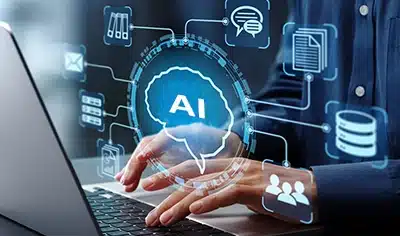AI has ushered in a new wave of transformative capabilities that are reshaping organizational strategies, fundamentally transforming the way businesses conceptualize, execute, and adapt their strategic imperatives. At the heart of this revolution lies Generative AI, a catalyst propelling businesses into uncharted territories of innovation, productivity, and efficiency by automating manual, time-intensive, and rule-based tasks that were previously done by humans. Besides propelling organizations beyond the realms of convention, this disruptive force compels businesses to reevaluate traditional notions of work dynamics, problem-solving, and creativity processes.
Built on top of foundation models, Generative AI can produce original content such as imagery, audio, video, computer code, text, simulations, synthetic data, and 3D renderings in response to text prompts. In other words, this disruptive technology can be used to generate various types of creative content based on the large volumes of unstructured or unlabeled data it is trained on. The interesting thing about this emerging technology is that it has something to offer for everyone, whether it’s a marketer aiming to captivate the audience, a financial analyst navigating complex markets, a healthcare professional seeking more accurate diagnoses, or an educator striving for personalized learning experiences. In a nutshell, Generative AI comes with an innate potential to revolutionize businesses across industries.
Reshaping Business Strategies With Generative AI: Explore Top Use Cases
1. Healthcare – Revolutionizing Diagnostics, Treatment, and Research
Generative Artificial Intelligence in healthcare has emerged as a game-changer since it offers innovative solutions that augment research, diagnostics, and treatment of longstanding health issues. This subset of AI has the ability to create new, realistic data or content based on information or patterns learned from existing datasets. Furthermore, this technology holds immense potential for transforming drug discovery, treatment planning, and personalized healthcare solutions.
Use Cases of Generative AI in Healthcare
- a) Medical Imaging: Generative Artificial Intelligence is making strong strides in medical imaging by generating high-quality, synthetic images for X-rays, CT scans, and MRI. This is beneficial in training ML models for tasks like organ segmentation, tumor detection, etc.
- b) Drug Discovery: The drug discovery process is not only time-intensive but also expensive. Generative AI helps in drug discovery by generating molecular structures for new drugs. It can also analyze existing chemical and biological data and propose novel molecules with therapeutic potential. This accelerates drug discovery timelines and reduces costs.
- c) Virtual Health Assistants: Intelligent chatbots and virtual health assistants powered by Generative Artificial Intelligence leverage NLP capabilities to understand and respond to patients’ inquiries, schedule appointments, provide medication reminders, and offer health-related information. By simulating human-like conversation, these intelligent assistants not only enhance patient engagement but also contribute to easy accessibility to healthcare resources, resulting in improved healthcare outcomes.
Navigating the Generative AI Landscape for Business Transformation
2. Retail – Improving the Overall Customer Experience
Generative Artificial Intelligence is making substantial inroads into the retail sector, offering a plethora of innovative solutions that not only revolutionize various aspects of the industry but also enhance the overall customer experience. Listed below are some popular use cases of this transformative technology in the retail sector.
Use Cases of Generative AI in Retail
- a) Visual Merchandising: Generative Artificial Intelligence can be used to produce visually appealing and realistic product images that attract customers and increase conversions. It can generate high-quality, synthetic product images, combining features from different backgrounds, lighting conditions, and angles without the need for extensive photoshoots, which in turn contributes to an enhanced user experience. These synthetic images not only offer a cost-effective alternative but also allow retailers to respond promptly to changing trends.
- b) Dynamic Pricing: Generative AI can process real-time data on customer behavior, competitor pricing, market conditions, and other relevant factors to dynamically adjust product prices. This adaptive pricing model not only maximizes profitability but also ensures responsiveness to changing market dynamics.
- c) Personalized Marketing: Generative Artificial Intelligence can analyze a large volume of datasets comprising purchase history, customer behavior, and preferences to create highly targeted and personalized marketing content, including targeted email campaigns, product recommendations, and personalized advertisements. In other words, this technology allows retailers to deliver content that resonates on a personal level, resulting in enhanced customer engagement.
3. Insurance – Efficient Claims Processing
Generative Artificial Intelligence is reshaping the insurance industry by introducing innovative solutions that streamline operations, automate the claims processing workflow, enhance risk assessment, and elevate customer engagement. Below is a detailed exploration of how this emerging technology is bringing about a paradigm shift in the insurance sector.
Use Cases of Generative AI in Insurance
- a) Fraud Detection and Prevention: Generative Artificial Intelligence plays a critical role in mitigating fraudulent activities within the insurance sector. By leveraging data analytics and advanced machine learning algorithms, Generative AI can analyze large datasets that include customer behaviors, historical claims, and external risk factors to identify patterns indicative of potential fraudulent activities. This disruptive technology continuously learns from historical data to detect anomalies and irregularities such as inconsistent information, unusual claim patterns, or suspicious activities.
- b) Automated Claims Processing: Generative Artificial Intelligence automates the entire claims workflow by extracting and analyzing relevant information from various documents, including forms, images, and textual data. By leveraging advanced Machine Learning algorithms, Generative AI can extract pertinent details, assess claim validity, and expedite the decision-making process. This not only streamlines the claims settlement process but also reduces the likelihood of human errors.
- c) Operational Efficiency and Cost Reduction: Generative Artificial Intelligence leverages Machine Learning algorithms and data analytics capabilities to optimize various insurance processes, including risk assessment, claim processing, and underwriting. The technology empowers insurers to streamline workflows, allocate resources more strategically, and focus on value-added services, which in turn leads to enhanced operational efficiencies and cost reductions.
Learn More About the Impact of Generative AI in Insurance
Summing Up
The transformative power of Generative AI is nothing short of revolutionary. As we navigate through the intricate landscapes of healthcare, retail, and insurance, it becomes evident that embracing this disruptive technology is not just an option but a strategic imperative for businesses across industries seeking to drive innovation, efficiency, and productivity. If you are also planning to harness the power of this emerging technology, it’s wise to seek Generative AI consultation from a reliable partner.






